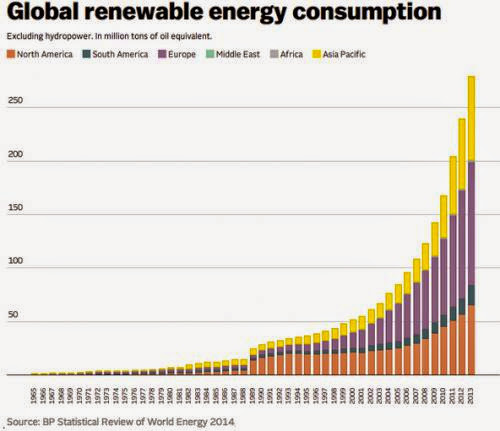The use of renewable energy is growing by leaps and bounds and this growth is coming from a variety of sources some of which may not be intuitively evident.The word's renewable energy leaders are well known. Most have heard about ambitious renewable energy achievements in nations like Germany, France, China, the US, the UK and Scotland. However, there are a number of somewhat unexpected countries working to expand their use of renewables in some interesting ways.The list of unexpected countries that are leading the way on renewable energy includes nations like India, Bhutan, North Korea, and the oil producing states of Iran, Norway, Nigeria and Bonaire.In 2012 India was singled out as a cleantech investment leader and more recently, the Indian government has announced ambitious plans to use solar energy to electrify every household in the nation. Indian Prime Minister Narendra Modi announced his plans to bring electricity to those who do not have it. This is a Herculean undertaking as there are currently 400,000,000 Indians without access to electricity. According to Narendra Taneja, the Indian government's energy spokesman, every household will be able to run at least two light bulbs, a television and also cook with a solar cooker by 2019. As explained in this video many of India's rural areas are already benefiting from solar energy.Bhutan may be a tiny nation nestled in the austere Himalayan mountains, but they are well are on their way to becoming the world first entirely organic nation and they are at the leading edge of adopting electric vehicles. In addition to "pedestrian day" as explained in this video, Bhutan is becoming an global leader in electric vehicles. To realize this goal Bhutan has partnered with Nissan. Initially government and taxi fleets are converting to electric powered vehicles, but the increased awareness and charging infrastructure will also increase the use of EVs among the general public.North Korea and Iran are infamous for being the two poles in what former President George W. Bush called, the "Axis of Evil". Even these nations have embarked on ambitious renewable energy projects. Iran is an oil producing state that is setting its sights on some pretty ambitious renewable energy objectives. The totalitarian nation has a target of 5,000 megawatts of new wind and solar power by 2018. As revealed in this 2012 video, Iran has been moving towards cleaner energy for years. Like Bhutan, Norway is also embracing electric cars. For both nations the corollary of more EVs is less consumption of fossil fuels and less emissions. Like Iran, Norway is a fossil fuel producing country. Despite being an oil producer, Norway has put its oil and gas reserves to work to help make it a sustainability leader. The nation's clean energy efforts include a number of hydroelectric power projects. The Norwegian parliament has also shown leadership through its plans to divest from fossil fuels. The African nation of Nigeria is another oil producing state, and while it is plagued with a number of problems, it is nonetheless planning to add an ambitious amount of renewable energy. The nation is working with SkyPower FAS Energy to add 3,000 MW of solar power over the next five years. The tiny island nation of Bonaire in the Caribbean is a working model of why the switch away from fossil fuels to renewables makes sense. RELATED2014 Year End Review: Renewable Energy AchievementsInfographic - The Cost of Renewable Energy2014 Year End Review: Climate and Energy Miscalculations2014 US State Energy Legislation ReviewState Renewable Energy: 2014 Business Facilities Rankings ReportBonaire Going 100 Percent RenewableGermany's Renewable Energy LeadershipClean Energy Can Replace Fossil FuelsRenewables Gaining on Fossil Fuels Despite Reports to the ContraryCanadian Clean Energy Grows Despite Ruling Conservatives Graphics - Renewable Energy: Economic Benefits and Scaling UK's Renewable Energy (Wind) Records in 2014Why Oil Prices Matter for Renewable Energy Subscribe in a reader


0 comments:
Post a Comment